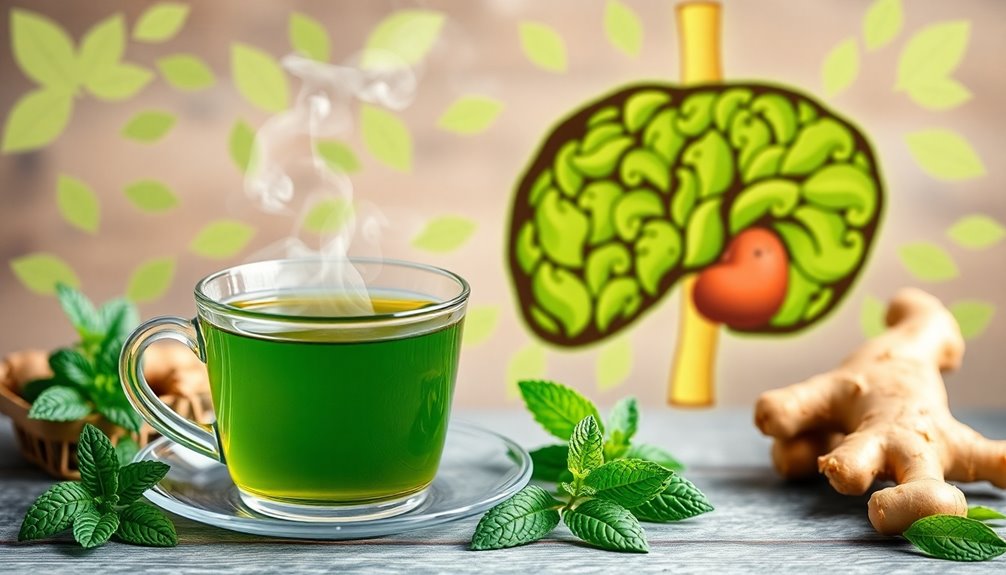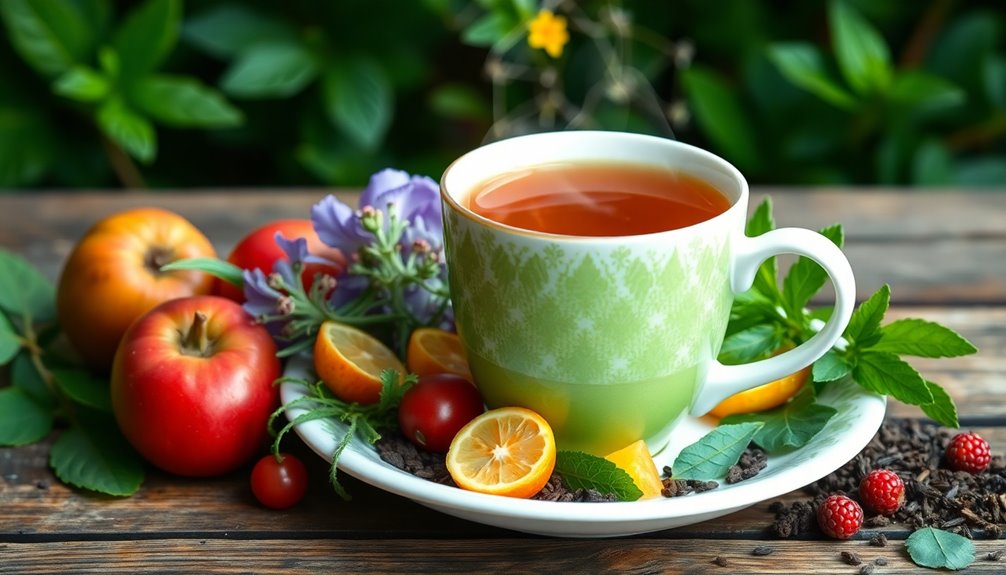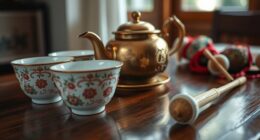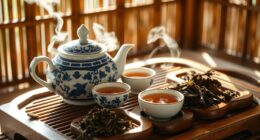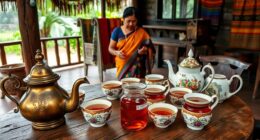In traditional Chinese medicine, herbal teas play a crucial role in supporting your body’s natural detox process. They combine ingredients like chrysanthemum, goji berries, and ginseng to enhance liver function and improve digestion. Cold infusions, steeped overnight, preserve delicate medicinal compounds and create a gentle, effective detox experience. These teas promote overall wellness, relaxation, and hydration—showing how ancient practices adapt beautifully to modern lifestyles. Discover more about how these herbal blends can help restore your body’s balance.
Key Takeaways
- Herbal teas in TCM contain ingredients like chrysanthemum, goji berries, and ginseng that support liver function and detoxification.
- Cold infusion methods preserve delicate phytochemicals, enhancing the detoxifying properties of herbal teas.
- TCM tea detoxes promote overall wellness by aiding digestion, reducing toxins, and restoring body balance.
- These teas are customizable, combining herbs to target specific health concerns in a gentle, effective way.
- Modern adaptations of TCM tea practices integrate traditional herbal wisdom with contemporary wellness routines for natural cleansing.
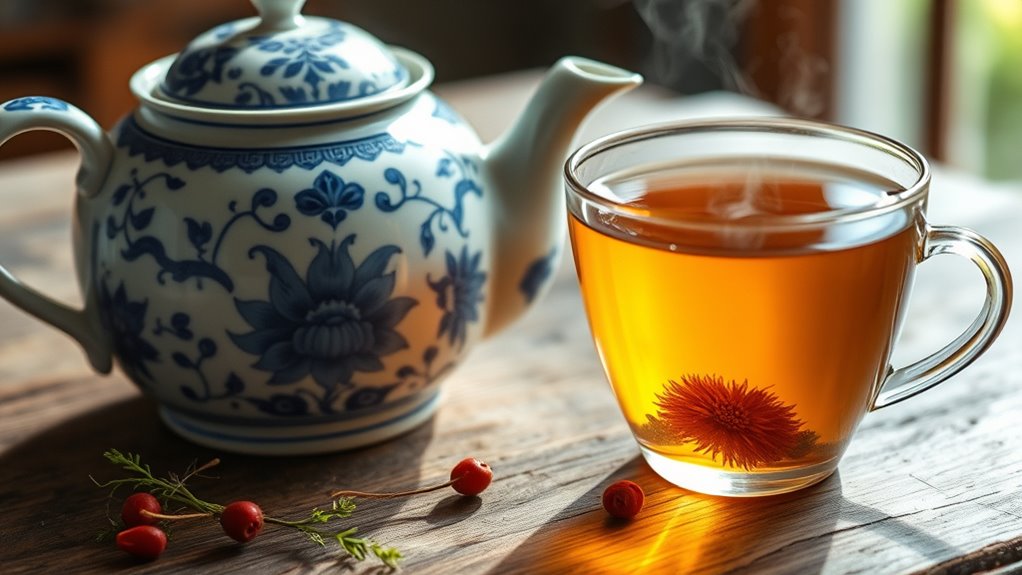
Traditional Chinese Medicine (TCM) has long recognized tea as a powerful tool for detoxification, harnessing its natural properties to cleanse the body and restore balance. When you incorporate herbal blends into your tea routine, you’re tapping into a rich tradition that emphasizes harmony between mind and body. These herbal blends often include ingredients like chrysanthemum, goji berries, and ginseng, which are believed to support liver function, improve digestion, and eliminate toxins. By choosing the right combination, you can target specific health concerns and promote overall wellness.
One of the innovative ways TCM uses tea for detox is through cold infusions. Unlike traditional hot steeping, cold infusions involve steeping herbs and teas in cold water over several hours or overnight. This method preserves delicate phytochemicals and reduces bitterness, making the tea more palatable and gentle on your stomach. When you prepare cold infusions with herbal blends, you’re able to extract subtle medicinal properties that might be diminished by heat. For example, adding slices of fresh ginger or lemongrass to your cold infusion can enhance detox effects while providing a revitalizing taste.
Cold infusions preserve delicate phytochemicals, making herbal detox teas gentler and more effective.
Using herbal blends in cold infusions allows you to customize your detox experience. You can combine ingredients like mint, chrysanthemum, or licorice root to create a personalized tea that addresses your specific needs. The process is simple: just place your chosen herbs and tea leaves in a pitcher, add cold water, and leave it in the refrigerator for several hours. This method not only makes detoxification more accessible but also encourages a calming, mindful ritual that can reduce stress and promote hydration.
Furthermore, cold infusions using herbal blends are especially beneficial during warmer months, offering a cooling, revitalizing beverage that supports your body’s natural cleansing processes. The slow extraction process ensures you get a gentle yet effective infusion of antioxidants and medicinal compounds. Because you’re avoiding heat, you retain more of the herbs’ delicate nutrients, maximizing their detoxification potential. Additionally, choosing quality materials for your herbal blends can enhance safety and efficacy, ensuring you receive maximum health benefits from your tea.
In essence, by embracing herbal blends and cold infusions, you’re tapping into a traditional yet innovative approach to detox that aligns with TCM principles. You can enjoy a flavorful, health-boosting beverage that nurtures your body, clears toxins, and restores balance—all while enjoying the calming ritual of preparing your own tea. This method exemplifies how ancient wisdom can be adapted to fit modern lifestyles, making detoxification both effective and enjoyable.
Frequently Asked Questions
Can Tea Replace Medical Detox Treatments in Traditional Chinese Medicine?
You shouldn’t think of tea as a complete replacement for medical detox treatments. While tea can support your body’s natural detox processes through herbal synergy, it’s not a substitute for professional detox protocols. Traditional Chinese Medicine emphasizes personalized approaches, combining herbs, acupuncture, and lifestyle changes. Relying solely on tea might miss underlying health issues, so always consult a healthcare provider for thorough detox strategies.
Which Specific Teas Are Best for Liver Detoxification?
You’re wondering which teas best support liver detoxification. Try herbal blends like dandelion root or milk thistle, known for their liver-friendly properties. Green varieties, such as matcha or sencha, are rich in antioxidants that help cleanse your liver naturally. Incorporate these teas into your routine for a gentle detox. Just remember, tea supports, but doesn’t replace, medical advice or treatment when needed.
How Often Should One Consume Detox Teas for Optimal Results?
Think of your detox journey as tending a garden; you need the right frequency to nurture growth without overwhelming. Follow frequency guidelines by drinking detox teas 1-2 times daily, allowing herbal potency to work effectively. Consuming too often may lead to imbalance, while too little could slow progress. Listen to your body, stay consistent, and enjoy the steady, natural benefits of your tea routine for ideal results.
Are There Any Side Effects of Using Tea for Detox in TCM?
You might wonder if detox teas cause side effects. While generally safe, excessive use can lead to tea toxicity, causing symptoms like nausea or dizziness. Herbal interactions may also occur, especially if you’re on medication or have underlying health issues. Always follow recommended doses, and consult a TCM practitioner if you experience adverse effects. Moderation helps prevent risks associated with herbal interactions and tea toxicity.
Is Tea Effective for Detoxing Specific Organs or Overall Cleansing?
Think of tea as a gentle river washing over your body, targeting specific organs or providing overall cleansing. Its herbal synergy works like a team, supporting liver, kidneys, or digestive health. While some teas may focus on organ targeting, many contribute to a holistic detox. Effectiveness varies based on the tea type and your body’s response, but overall, tea can be a natural tool for gentle, targeted cleansing.
Conclusion
So, next time you’re feeling sluggish, maybe skip the fancy detox diets and just sip some traditional Chinese tea. After all, who needs science when ancient herbal secrets promise instant purification? Just remember, a cup of tea might not turn you into a superhero overnight, but it sure beats chugging questionable juice cleanses. Cheers to keeping it simple—because nothing says “detox” quite like a humble brew and a little faith. Cheers!




